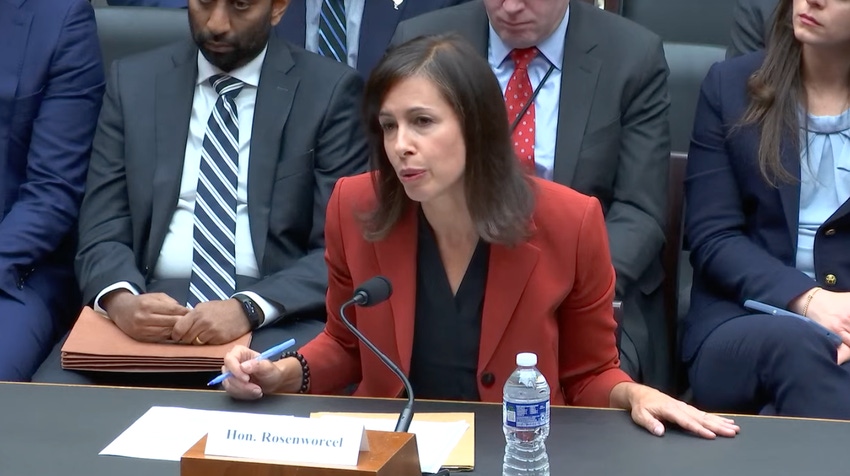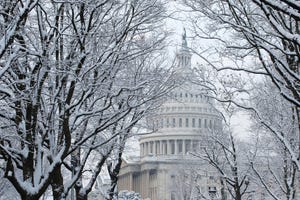Five takeaways from the House FCC oversight hearing
The House of Representatives held an oversight hearing of the FCC on Thursday, focusing on Title II, digital discrimination, spectrum, the ACP and more. Here are the main takeaways.

The House Energy & Commerce Committee held an FCC oversight hearing on Thursday, with a "Biden broadband takeover" theme, focusing largely on Republican concerns with the FCC's efforts to reinstate Title II and enact digital discrimination rules.
The hearing also covered the FCC's lapsed spectrum authority and the Biden administration's spectrum policy, as well as funding shortfalls for the Affordable Connectivity Program (ACP) and the rip-and-replace program, which funds removal of Chinese vendors' equipment from US communications networks.
Mostly, the three-hour hearing tread familiar, partisan ground, but it provided insight on a few important topics. Here are the main takeaways.
On the Affordable Connectivity Program
With the ACP expected to run out of funding by April 2024, and hopes growing dim that the House will satisfy a White House request to fund the ACP with $6 billion through 2024, multiple members of Congress pressed the Commissioners about the program's importance, as well as oversight issues surrounding the ACP.
Notably, Rep. Yvette Clarke, a Democrat from New York, said she intends to introduce legislation to fund the ACP before the end of the year, though it remains unclear if that bill would gain Republican support.
Asked when the FCC will need to alert providers that they have to send notices to ACP customers about the benefit ending, FCC Chairwoman Jessica Rosenworcel indicated that would need to happen early in 2024.
"We need Congress to continue to fund this program. If Congress does not, in April of next year, we'll have to unplug households, and based on current projections it'll be about 25 million households we will unplug from the Internet in April," said Rosenworcel. "If we do that, early in the year we'll have to let providers know that they're gonna have to give notice to every one of those households, every one of those consumers who counts on this program. We will also have to indicate to the providers that they can no longer enroll new households, and we'll have to work with our outreach coordinators to bring their efforts to an end."
On oversight issues, both Rosenworcel and Republican Commissioner Brendan Carr spoke about needing to boot non-compliant service providers from the program. Earlier this fall, the FCC Office of Inspector General (OIG) released a report warning of a "significant" threat to the integrity of the program posed by dozens of providers that may have improperly claimed reimbursements.
"We have informally sought the advice of the Office of the Inspector General to make sure the integrity of this program is secure. And I also think, we got bad actors, we've got to kick them out of the program," said Rosenworcel.
On net neutrality and Title II
One of the more theatrical topics of the morning was the FCC's move to restore Title II authority over broadband providers. Discussions around this fell along partisan lines, with Republicans on the committee and FCC calling the move a threat to broadband investment overall.
"This heavy-handed regulatory approach was designed to regulate monopolies. But today's competitive broadband market is far from a monopoly," said committee Chairwoman Cathy McMorris Rodgers, a Republican from Washington, in a comment that would come as a surprise to millions of Americans with access to a single broadband provider. But McMorris Rodgers added that her point was made "apparent" by Rosenworcel's decision to "forbear from 27 provisions in title two and more than 700 regulations" – including rate regulations.
On the net neutrality aspect of things, Rosenworcel was asked by Republican members if Democratic fears about the Internet being delivered "one word at a time" came true after net neutrality was overturned.
"No, but that's a result of more than about a dozen states stepping in and developing their own net neutrality laws," she answered.
Indicating fatigue around the issue, and an inevitable redo of this fight down the line, FCC Commissioner Nathan Simington, a Republican, urged Congress to act on the matter.
"I implore Congress to pass legislation to create an updated legislative framework for the modern Internet ecosystem that would end the continued whipsawing of industry over the Title II fight and create clear rules of the road for all companies in the Internet ecosystem," said Simington.
On spectrum policy
Another heated issue, rife with finger pointing, was the availability and allocation of spectrum, with everyone seeming to be at fault ��– from Congress for letting the FCC's spectrum authority lapse, to the FCC Chair for not publishing a spectrum auction calendar, to the Biden administration for failing to free up spectrum.
"From 2017 through 2020, the FCC freed up about 6,000 megahertz of licensed spectrum, in addition to thousands of additional megahertz of unlicensed [spectrum]. Now, the government will study less than 2,800," said Commissioner Carr. "In other words, the FCC put more spectrum into the marketplace during the last administration than the Biden administration even plans to study. And it's not even close."
Questions around spectrum also highlighted some tension between the FCC and the NTIA, due to the NTIA having yet to identify 30MHz of spectrum below 3GHz, used by the US military, for auction. The Biden administration's NTIA recently released its national spectrum strategy, which did not offer an official stance on the 3GHz band, and a Department of Defense (DoD) report on the subject has not been released to the public.
Indeed, Chairwoman Rosenworcel said she has requested a briefing on the DoD report but has yet to see it.
"We have an obligation to start an auction by July of 2024. So, we won't be able to do so unless we have an indication of what spectrum they would like us to work with," said Rosenworcel.
Crucially, however, the FCC will need to have its authority to auction spectrum reinstated.
"We also have identified the 12 gigahertz band for expanded licensed mobile use, but we badly need Congress to restore the agency's spectrum auction authority because it is an essential tool for our wireless leadership and success," said Rosenworcel.
On rip-and-replace funding
In addition to requesting $6 billion in ACP funding through 2024, the Biden administration recently submitted a request to Congress for $3.1 billion for the rip-and-replace program, funding the removal of Huawei and ZTE equipment from communications networks. That program was originally funded with $1.9 billion, but service providers and the FCC have long been pushing for an additional $3 billion to cover cost overruns.
"We've made great progress implementing the Secure and Trusted Communications Networks Act of 2019. But additional funding is needed to complete the removal, replacement and destruction of insecure equipment and services from our communication networks," said Commissioner Geoffrey Starks, a Democrat.
Rosenworcel added that carriers are getting less than half of the funding they need to be reimbursed for this effort.
"We're providing 40 cents on the dollar to a lot of small and rural carriers to rip this equipment out and replace it. They need more funds to get the job done and for our networks to be fully secure," she said.
On digital discrimination
Another partisan issue was the FCC's new digital discrimination rules, with Republicans arguing on behalf of the industry that the Commission exceeded its mandate with "far-reaching rules" and a "disparate impact" standard rather than a policy focused only on discriminatory intent. Both FCC Commissioner Carr and industry groups have indicated the rules will be challenged in court.
However, Chairwoman Rosenworcel defended the rules as in line with the statue in the Infrastructure Investment and Jobs Act (IIJA) mandating that the FCC eliminate digital discrimination.
"Congress gave us a very broad mandate in Section 6506 of the bipartisan infrastructure law that told us conclusively to prevent and eliminate digital discrimination," she said. "You did not limit it only to Internet service providers. You didn't limit it to only some terms and conditions. The language in this statute is exceptionally broad."
About the Author(s)
You May Also Like












